If Putin goes to the websites of the main sociological services – VTsIOM – the All-Russian Center for the Study of Public Opinion or FOM – the Public Opinion Foundation – he will see there both a pleasant and surprising picture. The data on how many Russians approve of his activities look almost like a straight line, steadily going up and hardly falling below 60%. Several times the president’s rating dropped to 57-58%. And after the war, it grew by 20% – from 64 to 82% according to FOM and from 62 to 79% according to VTsIOM.
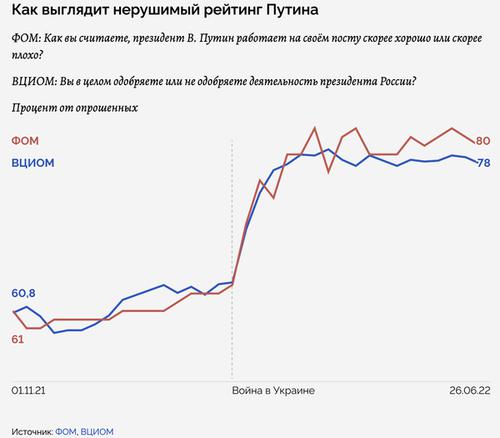
In fact, over the past few years, Putin’s rating has fluctuated constantly up and down. The complete picture should look like this:
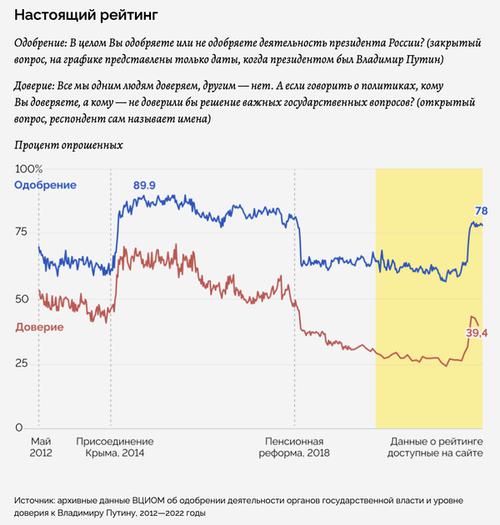
The clearly visible decline in 2018 seriously worried Kremlin officials, who knew that the president attaches great importance to his approval rating and could be seriously upset by such fluctuations. They came up with a simple solution – they turned to the FOM with a demand to publish new surveys without comparison with the old data, says a former FOM employee. The head of the FOM Alexander Oslon did not answer the questions of the “Project”. An interlocutor close to the Kremlin says that no such request was made to VTsIOM. The original version of the text said that the VTsIOM was also asked with a request, we apologize. Sociologists from the FOM really hid Putin’s ratings to the point of failure, and VTsIOM has previously published these data only in archival tables. Now only the latest numbers are visible on the websites of both services without any hesitation. Now in the weekly bulletins “Dominants” from FOM you can find data on Putin’s rating since June 2021 (latest bulletin). And, for example, the bulletin for 2019 provided data from 2008. And at VTsIOM site only data from the beginning of 2020 is visible.
The “project” spoke with employees of sociological services, as well as with people who at various times worked in the presidential administration, compared their stories with public data and found out that Putin attaches such great importance to his rating that for his sake the authorities went to significant manipulations of public opinion polls .
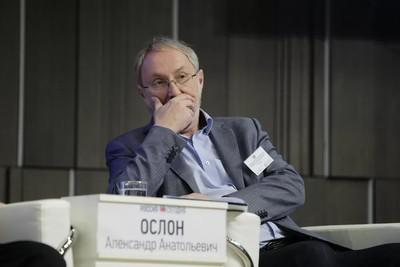
How the correction factor did not work
In January-February 2000, VTsIOM predicted – Putin will gain 57-62%, and the candidate of the Communist Party of the Russian Federation Gennady Zyuganov – 15-19%. But in the elections, Putin received 52.9%, and Zyuganov – 29.2%. A gap of 10% for sociologists is a serious mistake. The same problem was with FOM. Sociologists realized that they were missing out on communist supporters and tried to correct this with a correction factor based on past election results. It did not help: before the scandal with the ratings, in August 2003, VTsIOM gave 23% support to United Russia and 28% to the Communist Party, FOM – 22 and 20%, respectively. In the December elections, United Russia received 37.5%, and the Communist Party – 12.6%.
The threat quickly materialized – Levada was summoned to the Kremlin, fired, says Levada’s associate, later director of the Levada Center, Lev Gudkov, and he had to create an independent Levada Center, which will still face problems in the future (read about them below). Set to lead VTsIOM Valeria Fedorova – an acquaintance of the then deputy head of the Kremlin department for domestic policy Alexey Chesnakov, says Anna Kuleshova and Alexander Bratersky, a book about the history of VTsIOM “Open Question”. Both are graduates of the Faculty of Philosophy of Moscow State University.
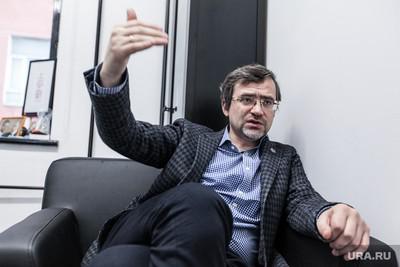
Fedorov never missed a meeting in the Kremlin. Sociologists were very important participants in meetings on “political planning” – these events often even began with Oslon’s report on the dynamics of power ratings over the week, says Pavlovsky and confirms the former head of one of the departments of the internal political bloc of the Presidential Administration. At the same time, the president’s schedule was discussed – what events he should attend and what topics to raise – taking into account the reaction of voters to Putin’s previous statements. If something went wrong, the plans changed. But it has become even easier to change sociology itself – researchers have since become malleable and did not want to spoil the president’s mood.
Who carried out “political planning”
Until his resignation in 2003, they were held by the head of the presidential administration Alexander Voloshin, and they discussed the plans of the president, the current political agenda, as well as how the media will cover the work of the head of state. After Voloshin’s resignation, meetings on the political agenda were held first by Vladislav Surkov, and then by his successors as curators of domestic policy – Viacheslav Volodin and Sergei Kirienko. At the same time, a separate meeting appeared for the heads of TV channels – over time, it began to be held by the propaganda curator Alexey Gromov.
Another reason to get upset with the “national leader” – as Putin’s associates began to call Putin during the premiership – appeared in 2010, during the reign of Dmitry Medvedev. Then the ratings of the young president and the experienced prime minister suddenly became equal, and the most unpleasant thing was that about the same number of voters were ready to vote for Medvedev in the next elections as for Putin – 21% and 24%, respectively, called figures from the BBC Levada Center. Medvedev’s approval rating was 76% and Putin’s was 77%. We know these figures only thanks to the Levada Center.
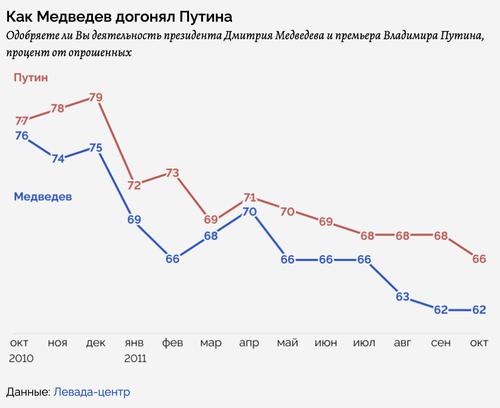
Pro-government sociologists simply concealed this data. FOM then received exactly the same figures, but the Kremlin forbade them to be published, Pavlovsky recalls. VTsIOM did not ask such a question at all – either Putin or Medvedev were present in the lists of answer options. From the start of Medvedev’s term to March 2011, in response to the traditional question: “Who would you vote for if the elections were held next Sunday?” Putin was absent. And in the fall of 2011, when became knownthat Putin will go to the next presidential election, Medvedev also disappeared from the polls. Several times in 2011, VTsIOM asked the following question: “Let’s assume that Dmitry Medvedev will nevertheless participate in the presidential elections in March 2012. Which of these candidates would you most likely vote for? Putin was not among the options. “In order not to push foreheads together,” explains Igor Eidman, a former VTsIOM employee. By this time, Eidman no longer worked at VTsIOM and knows about this from the words of former colleagues.
The Kremlin was jealous of not only the rating of Medvedev, but even of the governors. “Some regions were presented with: ‘Why is your governor’s rating growing, but Putin’s rating is not?’,” recalls the political strategist who worked on regional campaigns.
Since 2018, for the sake of the president’s peace of mind, VTsIOM has generally stopped comparing him with other politicians. Sociologists simply stopped asking the question of voting in the next elections, recalls a sociologist who worked at VTsIOM in those years, his words are confirmed by data from the VTsIOM database. An interlocutor close to the presidential administration assures that the issue will be resumed in 2023, a year before the presidential elections. But until 2018, the question was asked annually, usually several times a year. But the absence of competition was not enough for Putin – for the sake of correct answers, sociologists began to use manipulation tools.
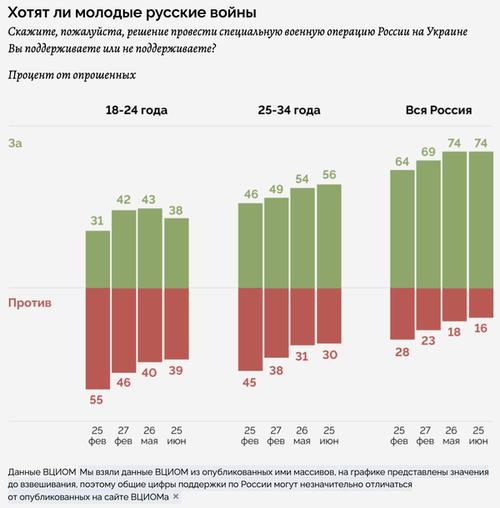
All interlocutors of the “Project”, including former employees of both centers, assure: neither VTsIOM nor FOM “draw numbers”, it is enough to ask the right questions to the right people. Then the answers will be “correct”, especially since every year citizens are more and more afraid to talk to sociologists.
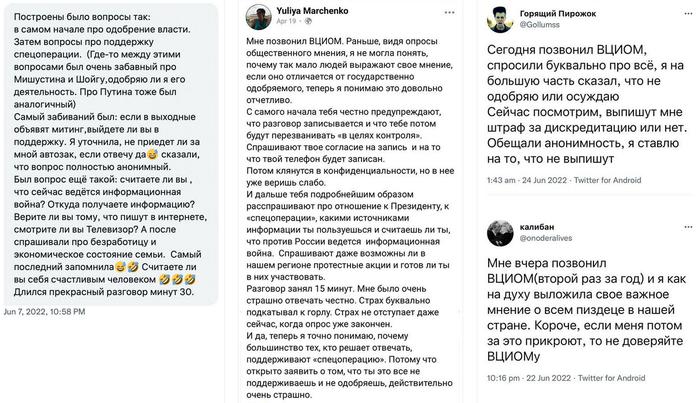
This spring, VTsIOM twice, at the end of April and at the end of May, conducted surveys for the Kremlin in the cities and villages of the Donetsk region, just captured by Russia – Mariupol, Volnovakha, the villages of Mangush and Volodarskoye, as well as the village of Bezymennoye, one of the organizers of these surveys, his identity was confirmed by another sociologist familiar with market participants. The collaboration of this person with VTsIOM is also confirmed by the data of the Getcontact service, and was confirmed by an interlocutor close to the Kremlin leadership. In addition, another market participant knows that among the sociologists they were looking for a contractor for such a project. And the third claims that the authorities consulted with him about the very possibility of conducting polls there. People were asked how they feel about the “special operation”, Vladimir Putin and Vladimir Zelenskywhether they want their city to become part of Russia or the DPR, remain part of Ukraine or become independent. The results have not yet been published anywhere, but according to the survey organizer, most people said they wanted to go to Russia.
It is clear why this happened – in Volnovakha, Mangush, Volodarsky and Bezymenny, the interviewers worked in temporary accommodation centers for refugees, says the source of the Project. And in Mariupol, according to him, at the end of April they were interviewed only at the place of issue of humanitarian aid from United Russia. And only in May they spoke to people on the streets, that is, where they did not feel such dependence on the occupying authorities.
Why can’t this be done?
It is impossible to conduct polls in the occupied territories, says independent sociologist Elena Koneva:
“The combination of demonstrative humanitarian action with brutal repression creates a feeling of complete unpredictability. Frightened citizens will give “safe” answers, opponents of the war will give “correct” answers, and at night draw graffiti against the occupiers.
The answers received are simply unreliable, but, Koneva is sure, the Russian authorities are not interested in this – they will use the results primarily for reports to Moscow and for propaganda purposes: “We are welcome here.”
And within Russia, the VTsIOM and FOM polls show a high (65-76%) level of support for the invasion of Ukraine. But few people admit it – the majority refuses to communicate with sociologists. For example, Russian Field researchers, together with Maxim Katz, conducted a survey on attitudes towards the war – 29.5 thousand people out of 31 thousand refrained from answering, Katz wrote in twitter. An employee of the regional contractor FOM also speaks about the growing share of refusals: “If earlier, from the standard interviewer’s route list of 18 people, about one in three agreed to speak, then after the start of the “special operation”, only one in six. They say directly: “I don’t want to sit down.” True, sometimes the authorities are still interested in knowing the real opinion of the population – but no one will know about such polls.
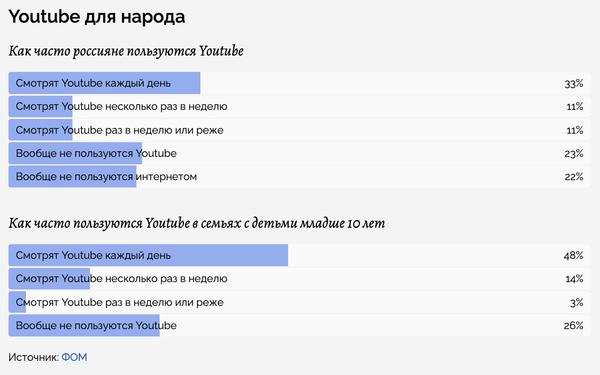
Most likely, the results of these polls had an impact on the future of the service, two interlocutors of the Project heard about this – a sociologist collaborating with government agencies and a political strategist close to the Presidential Administration – the Kremlin is not currently considering the option of blocking Youtube. At least two interlocutors close to the leadership of the presidential administration at once confidently say that the issue of blocking hosting “is not worth it now.”
The Youtube story is the rule rather than the exception. If the poll results show growing discontent among Putin’s supporters, the authorities do not publish such data, but they may react. For example, in the spring of 2017, VTsIOM conducted a survey about the renovation program in Moscow, two former VTsIOM employees say. The study showed that the renovation is perceived as a mistake by Putin, not the mayor Sergei Sobyanin. And the authorities immediately decided to soften the rhetoric and not rush with renovation – Sobyanin then promised “Take careful note of all the substantive statements made at the rallies.”
In total, at least a third of the results of sociologists are not published, says former VTsIOM employee Dmitry Rudenkin. A former employee of the FOM calls a figure of 50-70%. It turns out that the people have no right to know their own opinion on most issues.
Very often polls about Alexei Navalny are not published. VTsIOM asks about the attitude towards him in almost every telephone survey, but the results are unknown to anyone. On the websites of VTsIOM and FOM in recent years, Navalny’s name is found only in answers to open questions, that is, where the respondents themselves spoke about him. At the peak of last year’s protests after the trial of Navalny, FOM, commissioned by the authorities, studied the values and political sympathies of young people aged 17-35 in a focus group format. The report on the results of this study, which was in the possession of the “Project”, was never published, and it is clear why. The resetting of Putin’s presidential terms and the arrest of Navalny were considered by the participants of the study to be the worst events in recent years. And the main conclusion of the study probably did not like the Kremlin at all:
“Among the informants, there are those who sympathize with Putin and those who feel antipathy towards him, many treat him neutrally, indifferently. But practically no one would vote for him now.”
From the FOM study of the values and political sympathies of young people
In conditions when the Kremlin could easily ban FOM and VTsIOM from publishing any material, only the Levada Center spoiled the picture. But here, too, the authorities found a way out – they banned the controlled media, and these are almost all the media remaining in Russia, from publishing news according to their polls. This happened two years ago, the head of the center Denis Volkov knows. According to him, you can only refer to the results of old studies, but this is rarely done.
Who was banned from publishing Levada Center data
Latest news on Levada research on Kommersant website released in August 2020.
Vedomosti has the same picture: the latest news is August 2020.
On the RBC website — April 2020 .
Since January 2020, Russia Today has no news on Levada.
Gazeta.ru from the same moment released two news items based on polls of the service – about waste sorting and attitude of Russians to nuclear energy.
Since February 2020, there is no such news on the website of the 360 TV channel.
So sociology finally turned into an instrument in the hands of the authorities.
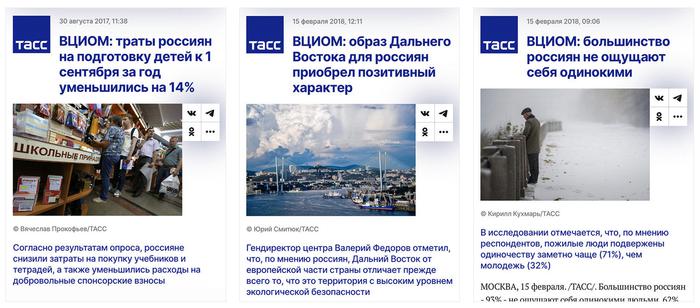
Often, with the help of polls, the authorities try to program public opinion. A few years ago, the Kremlin decided to promote Party “New People” – then VTsIOM began to regularly publish polls, from which it followed that an unknown party would go to many regional parliaments, and then get into the State Duma. For example, a little more than a week before the 2020 regional elections, VTsIOM published analytical reviewdedicated to the chances of the “New People” in the elections. The party in it was called one of the leaders in several areas. And before the Duma elections in 2021, VTsIOM commissioned by the party conducted a study, as a result of which he predicted to New People the highest chances of entering the Duma from non-parliamentary parties. These data were actively replicated by the pro-Kremlin media: “First channel, TASS, “Moscow’s comsomolets”, life.ru and others and “New people” ended up in the State Duma. The interlocutor, close to the Kremlin, insists that polls were not ordered in the presidential administration, often orders came from the party itself.
How sociology “predicted” election results
A similar technique was used by political strategist Gleb Pavlovsky back in 1999 – he published exit poll data on his website right on voting day in the State Duma elections. Then the rule of the day of silence applied only to the media – and Pavlovsky took advantage of this, saying that the Internet is not the media.
The data of these exit polls, which showed that the Unity bloc created to support Putin in the upcoming presidential elections (in 2001 it was transformed into United Russia) was in first place, and the Union of Right Forces party, which was friendly to him, was in third place. These results were even read live on Vesti, and even before the voting ended in all regions. The parties, of course, entered the parliament.
Loyal media often help sociologists promote an alternative agenda. In 2021 RIA Novosti reported: “Half of Russians experienced positive emotions while watching a direct line with Putin.” How the study was conducted was not mentioned in the note. Although on VTsIOM website, according to which journalists wrote the news, it is directly stated that this is not an all-Russian survey, but focus groups of 123 people. So 66 people turned into half of the Russians.
It is not surprising that such important services for the authorities are expensive. And on this there is someone to earn.
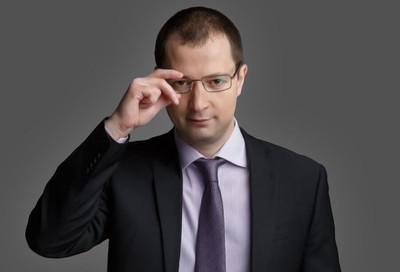
Almost simultaneously, his wife Anna became the owner and head of the Insomar company. The company was founded in 2004 by sociologist Sergei Khaikin, who collaborated with the presidential administration back in the 2000s. According to a Project source familiar with the situation at Insomar, Yevgeny Mikhailenko had known Khaikin for a long time and had been involved in the company’s activities since its inception. Insomar received orders from the Kremlin even under Khaikin, but with the advent of Mikhailenko, their number began to grow noticeably. Khaikin himself, when asked by the “Project” about why he transferred the company to Anna Mikhailenko, said that she was “a good specialist.” Apparently, so that the situation does not look too defiant, in 2015 Anna transferred the shares of the company to her partners, whose connection with the Mikhailenko spouses is easily established. In 2015, control of Insomar passed to Maria Zvyagina – but Zvyagina and Mikhailenko in the past jointly established the Orthodox organization “Orthodox Parish of the Church of the Holy Martyrs Faith, Hope, Lyubov and Sophia” in Volgograd. And after Anna Mikhailenko, Natalya Fadeeva became the director of Insomar – she once took over from Evgeny Mikhailenko the leadership in the Volgograd marketing company AMK LLC. This company still receives contracts from companies associated with the Mikhailenko family. Later, Mikhailenko created another structure with her husband – (ANO) “Big Country”, which in 2016 she transferred to her brother Alexei Paramonov. This is Anna’s maiden name, it says on her page in Odnoklassniki, their patronymics also coincide, in Volgograd, where both come from, they lived at the same address. And now Olga Paramonova is in charge of ANO.
Insomar and Big Country regularly receive orders for sociological research and, accordingly, payments from the so-called Kremlin “operators” – structures that distribute money between contractors of the presidential administration. One such operator is EISI. Expert Institute for Social Research, whose Board of Trustees is headed by the Chairman of the Supreme Council of United Russia and the Ambassador of Russia to Belarus Boris Gryzlov, and the executive director is Anna Fedulkina, a longtime associate of Alexander Kharichev, Mikhailenko’s boss in the Kremlin. Another company that transfers money to legal entities associated with the official’s family is the Polilog PR agency, which until 2017 was headed by the same Fedulkina.
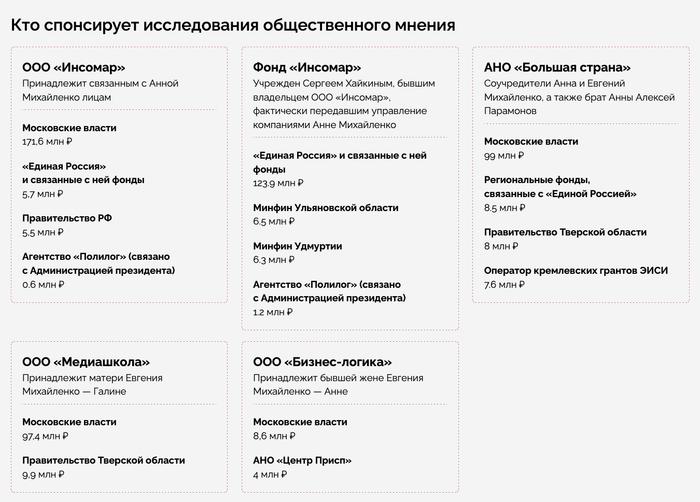
Yevgeny Mikhailenko told the Project that he divorced his wife in 2017 and has not been aware of Insomar’s affairs since then. However, very much indicates that this divorce could be formal and did not prevent the family from continuing to earn money together. For example, Anna Mikhailenko, until at least 2020, managed the company owned by the mother of her ex-husband Galina Mikhailenko – now it is called Mediashkola LLC. In 2020, the former spouses jointly became the owners of an apartment in Moscow on Novocheremushkinskaya Street, it follows from the documents that were at the disposal of the Project. In addition, from the leaks of the CDEK and Yandex-food databases, it follows that in 2021-2022 Anna constantly ordered delivery to the address where in February 2022 her ex-husband registered a new legal entity CITY Center LLC. Friends of the former spouses claim that they have seen them together more than once, including with their children. At the end of 2021, immediately after the elections to the State Duma, which brought Insomar many orders and hundreds of millions of rubles, Mikhailenko left the presidential administration. Now he shares the experience of young people – he heads one of the faculties of the Higher School of Economics, namely the Faculty of Urban and Regional Development, and also directs the Center for Social Research and Technological Innovation at the Higher School of Economics, which conducts political and socio-economic research, from which many liberals have been fired in recent years. teachers.
When the war broke out in Ukraine and the pro-government media, on the orders of the Kremlin, began to publish news about Russian support for hostilities, sociologist Sergei Khaikin tried to convey to Putin that this was not entirely true. Together with a group of sociologists, he conducted a study from which it turned out that among young people, Muscovites and St. Petersburg residents, there is a high proportion of those who disagree with the decision. The researchers did not publish these data, considering that it would not be timely. They were not provided to the “Project” either. Khaikin, who had previously worked with the Kremlin, periodically managed to pass the data of his polls to the president through officials he knew, and he hoped that he would succeed now. But lately he has been answered more and more often: “There is no need to upset Vladimir Vladimirovich.” And this time they hinted that the publication of such materials is now inappropriate.









